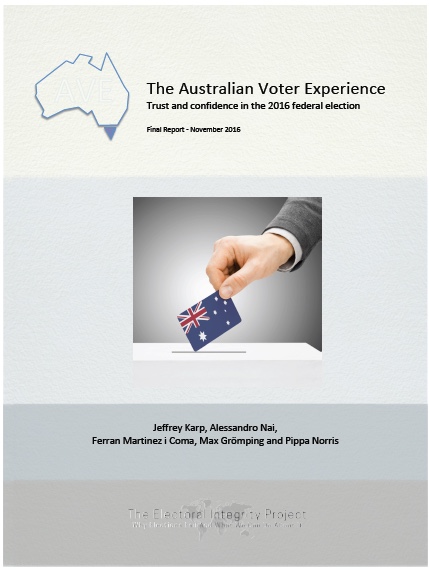New Policy Report: The Australian Voter Experience
New Policy report
The Australian Voter Experience:
Trust and Confidence in the 2016 federal elections
By Jeffrey Karp, Alessandro Nai, Ferran Martinez i Coma, Max Groemping and Pippa Norris
Sydney: University of Sydney, November 2016.
It is vitally important that all Australian citizens are satisfied with the electoral process and confident that their vote counts. Any doubts about the integrity and security of the registration and balloting process, as well as public dissatisfaction with the efficiency, fairness, and transparency of how elections are managed, have the capacity to erode citizen’s trust in political parties and parliament, to fuel public disaffection with government, reinforce cynical views about politics and even to undermine faith in democracy
This EIP report presents the data of a new 3-wave panel survey designed to gather the views of a representative sample of ordinary Australians just before and after the 2nd July 2016 Australian federal elections. The survey monitored Australian voters’ experience at the polls, perceptions of the integrity and convenience of the registration and voting process, patterns of civic engagement, public confidence in electoral administration, and attitudes towards reforms, such as civic education campaigns and convenience voting facilities.
The study was commissioned by the Australian Electoral Commission, and conducted by the scientific team at the Electoral Integrity Project (EIP).
The survey evidence highlights three major findings:
Australian doubts about electoral integrity.
In particular, around one in four respondents in the AVE sample believe that fraud occurs ’usually’ or ‘always’ during Australian elections, with this proportion rising among supporters of minor parties, the less educated, women, and the younger generation.
Moreover, four out of ten Australians believe that fraud is likely to affect the outcome of elections.
Such doubts about the integrity of elections, whether perceptions are true or false, can undermine public faith in the legitimacy of the democratic process.
The Commission therefore needs to investigate further to understand more fully the reasons why a substantial minority of the public believe that fraud is common and consider how best to restore confidence in the integrity of the electoral process.
Australian confidence in democracy
At the same time, the extent of these problems should not be exaggerated; the majority of Australians expressed considerable confidence in the electoral process.
For example, two-thirds of all Australians said that they were ‘very or somewhat’ satisfied with the fairness of elections.
The majority of the electorate was satisfied with the AEC’s ability to conduct an election, to ensure that preferences are counted accurately, and to keep private voting information safe and secure.
In general, half of all Australians were satisfied with the way that their democracy works.
These findings suggest that overall there is a broad reservoir of trust and confidence in the work of the Australian Electoral Commission and the way that elections are managed in Australia.
New voting facilities
Finally, the survey also monitored public reactions towards specific registration and voting facilities, and potential reforms. Several findings are relevant for the work of the AEC.
Thus, on average, voters said that they did not find it difficult to vote at the polling stations. Those who had to wait longer, however, were more likely to express doubts about the AEC’s ability to conduct an election.
The evidence suggests that the AEC could seek to improve the provision of timely communications about any issues arising during the campaign or its aftermath, as well as expanding civic information campaigns about the electoral system well before any contests. The AEC should also further consider the use of digital registration and balloting processes which could potentially improve the convenience of the voting process, while still maintaining the security and integrity of Australian elections.

